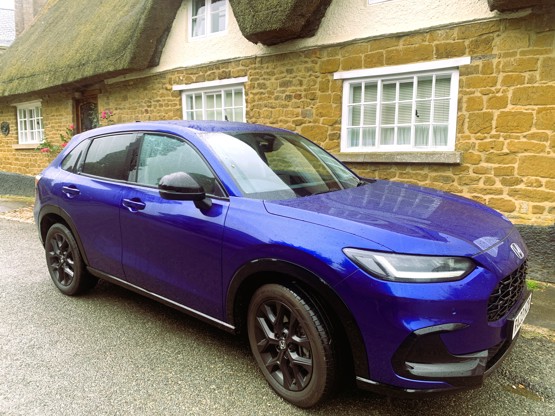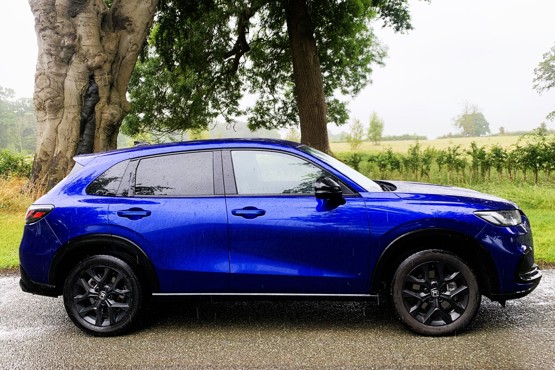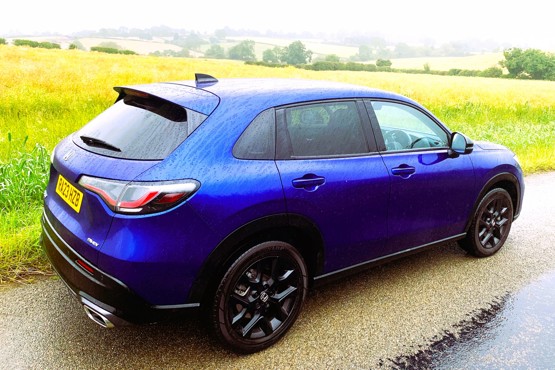Review
AM discovers why the Honda ZR-V e:HEV is such a standout transitional candidate for those EV-curious souls seeking real-world efficiency.
Owning the same car for any length of time imprints the experience indelibly in the cerebral cortex so the ability to compare performance with a similar car requires little effort.
So the opportunity to swap a trusty 2017-plate 1.6 litre Nissan Qashqai for the Honda ZR-V medium SUV offered the opportunity to compare plenty.
The Qashqai has always offered a good balance between ride comfort and handling with responsive steering and little in the way of body roll.
Of course, with the prospect of embracing full-on electric proving a little daunting in as much as concern over whether the nation’s infrastructure will keep pace with EV adoption, the Honda's ZR-V represents a compelling advanced hybrid petrol option in the medium SUV segment.
Over the last three months, this long-term test drive has blended performance, efficiency, and superb fuel efficiency thanks to a fusion of ICE and electric motor technology.

Performance and Efficiency
The ZR-V's hybrid powertrain combines a 2.0-litre Atkinson-cycle engine with twin electric motors, delivering a robust 181bhp performance comparable to traditional 3.0-litre ICE equivalent, with a 0-62mph time of 7.8 seconds.
Best-of-all-worlds WLTP figures indicate CO2 emissions of 130g/km and a combined fuel economy of 49.5mpg. Real-world driving, however, reflect a certain variability depending on driving conditions, with motorway driving yielding an mpg in the high 30s while slower, mixed roads and urban settings is where the ZR-V efficiency kicks in certainly in the high 40s.
How the ZR-V powers the hybrid experience
The transition between electric and petrol modes is seamless, ensuring a quiet and comfortable ride, particularly on city roads where the electric motor handles most of the work – there’s even a dashboard option which tells you which powertrain is actually driving the car.
That makes for a smooth and responsive driving experience especially in tactical urban manoeuvring. The vehicle's stability at high speeds, controlled body roll, and precise steering further make it a reliable companion for both city commutes and long-distance travel. AM plans to cover the driving experience in more detail in its next look at the Honda ZR-V.

Cost and Value
With a starting price of £39,495, plus optional add-ons for metallic finishes, the ZR-V is admittedly on the higher end of the medium SUV market.
While it faces stiff competition from similarly priced rivals like the Nissan Qashqai and the Hyundai Tucson, the Honda ZR-V offers a compelling blend of efficiency, performance, and features that justify its cost.
A limited-time financing offer and deposit contribution further enhance its value proposition, making it a worthwhile consideration for buyers seeking a well-rounded hybrid SUV.
The offer which ends on September 30, allows buyers to benefit from a 6.9% APR with a £2,500 deposit. Based on 37-month Personal Contract Purchase (PCP) deal, the total amount payable on a ZR-V e:HEV Full Hybrid Elegance is £44,757.73 at £439 per month.
Supported by a comprehensive ownership package of a five-year service plan; five-year warranty; and five-year roadside assistance, makes the ZR-V an even more attractive proposition.

Verdict
The Honda ZR-V stands out in the medium SUV market with its advanced hybrid powertrain, and impressive fuel economy, While it carries a premium price tag, the current promotional offer significantly enhances its value for money. Backed by Honda's reputation for reliability, the ZR-V is an appealing option for those in search of, above all, an efficient car.
Price: From £39,495
Engine: 1993cc four-cylinder hybrid
Power: 104bhp @ 6000rpm, 137lb ft @ 4500rpm (plus 135kW electric motor)
Transmission: Single-speed automatic, front-wheel drive
Performance: 7.9 sec 0-62mph; 107mph,
Efficiency: 48.7mpg, 131g/km CO2

Author:
Aimee Turner
Deputy editor
AM deputy editor Aimée Turner has been a specialist B2B editor and journalist covering the international transportation sector for more than 20 years.
She has specialised in the significant safety, regulatory, and environmental issues that impact advanced technology businesses in the pursuit of more efficient, safer and sustainable transportation modes.















